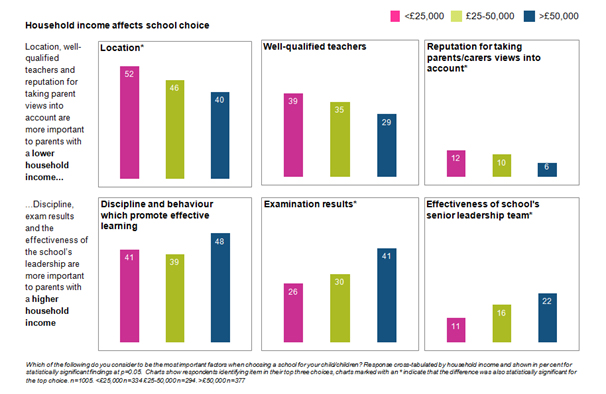Yesterday, I wrote about how, according to new NFER research, a majority of parents feel that they have a genuine choice in choosing a school. I also noted how local factors, such as the ‘school that suits my child’ and the location of the school were some of the most important factors in this choice. However, there is a little more nuance to this second point that needs to be explored…
When analysed by household income, the data reveals some interesting differences between the importance attributed to different factors. Location, well-qualified teachers and community links are more important to parents with a lower household income whilst discipline, exam results and the effectiveness of the school’s senior leadership team are more important to parents with a higher household income.
The reality is that making a choice about a school depends on a myriad of local factors as well as a parents’ understanding of their own child. However, at a policy level these findings have significant implications.
Both Labour and the Conservatives back changes to the School Admissions Code which will prioritise children eligible for the pupil premium. Yet this evidence suggests that parents of these children are least likely to take advantage of any increase in their school choice as they are more concerned with location.
NFER is not the first organisation to raise these concerns. In 2013, the Sutton Trust reported that ‘those who adopt the choice behaviours anticipated by government policy… are disproportionately, though by no means exclusively, middle class’. Similarly, a DFE report published last year found that ‘lower socio-economic status groups may look for [factors that]… may lead [them] to select themselves out of high performing schools’.
Last night the education spokespeople for the three main parties debated how to make education fairer. Whoever ends up as Secretary of State will need to reflect on the evidence for any further reform of school provision and the extent to which a market-led approach to school choice will ultimately raise standards for those in the most disadvantaged circumstances.


May 5, 2015 at 8:17 am
Interesting to note that Andreas Schleicher/the OECD is arguing that the role of parental choice and free schools in Sweden has contributed to the deterioration of the country’s international rankings and exacerbated educational inequality. A new report from OECD urges Sweden ‘to revise school choice arrangements to ensure quality with equity’. See ‘Sweden urged to rethink parents’ choice after education decline’, the Guardian, 04 May. Available: http://www.theguardian.com/world/2015/may/04/sweden-school-choice-education-decline-oecd